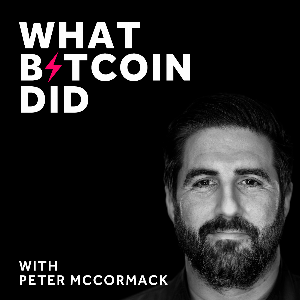Podcasts: Scaling Bitcoin with Giacomo Zucco, John Carvalho & Matt Corallo 🔗 16 weeks ago

- Category: Podcasts | What Bitcoin Did
- Author(s): Peter McCormack
- Published: 9th January 2024 13:58
“Within the Bitcoin mission, all of that stuff is a LARP. There is no gray; it’s entirely black or white. You’re either self-sovereign, or you’re not…if you want to have conversations about banking technology, custody technology, if that’s your interest, great. Just leave it out of my Bitcoin conversation.”
— John Carvalho
Giacomo Zucco is a Bitcoin educator, John Carvalho is CEO of Synonym, and Matt Corallo is a Bitcoin Core developer and open-source engineer at Block/Spiral. In this interview, we discuss how to scale Bitcoin while maintaining self-sovereignty.
- - - -
The best way to scale Bitcoin has been a hot topic since its inception. Whether it be through Bitcoin-backed banks as Hal Finney suggested back in 2010, increasing the throughput on the Bitcoin blockchain, layer 2 solutions like the Lightning Network, or federated custodian options like Fedimints.
Over the past year, the surge in Bitcoin transaction fees, largely attributed to the emergence of BRC20 tokens, ordinals, and inscriptions, has once again brought the topic of scaling Bitcoin to the forefront of conversation. High fees have priced smaller transactions out of the market, and the Lightning Network, hailed as a potential solution to scalability challenges, has faced some initial hurdles.
The different scaling solutions all have different trade-offs. Trustlessness and trust minimization are key tenets of Bitcoin, ensuring that users do not need to trust any central authority or third party. The Lightning Network aligns with these principles as it enables trustless, peer-to-peer transactions, reducing the need for custodial services and enhancing individual control over funds.
While Bitcoin's primary focus is on decentralization and self-sovereignty, some developments, such as the concept of the "Wallet of Satoshi" or Bitcoin ETFs, aim to make Bitcoin more accessible and user-friendly to a broader audience. Wallet of Satoshi is a custodial Lightning wallet designed to simplify the user experience, while Bitcoin ETFs provide a means for traditional investors to gain exposure to Bitcoin without directly holding the asset. These developments have the potential to expand Bitcoin's adoption, but may raise concerns about centralization and counterparty risk.
- - - -
This episode’s sponsors:
Iris Energy - Bitcoin Mining. Done Sustainably
Bitcasino - The Future of Gaming is here
Ledger- State of the art Bitcoin hardware wallet
Wasabi Wallet - Privacy by default
Unchained - Secure your bitcoin with confidence
Bitcoin Atlantis- A Bitcoin conference in the Atlantic
Swan Bitcoin - Invest in Bitcoin with Swan
-----
-----
If you enjoy The What Bitcoin Did Podcast you can help support the show by doing the following:
Become a Patronand get access to shows early or help contribute
Make a tip:
Bitcoin: 3FiC6w7eb3dkcaNHMAnj39ANTAkv8Ufi2S
QR Codes: Bitcoin
If you do send a tip then please email me so that I can say thank you
Subscribe on iTunes | Spotify | Stitcher | SoundCloud | YouTube | Deezer| TuneIn | RSS Feed
Leave a review on iTunes
Share the show and episodes with your friends and family
Subscribe to the newsletter on my website
Follow me on Twitter Personal | Twitter Podcast | Instagram | Medium|YouTube
If you are interested in sponsoring the show, you can read more about that here or please feel free to drop me an email to discuss options.






